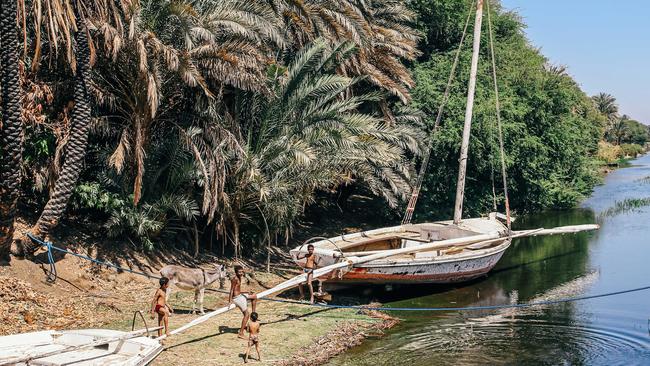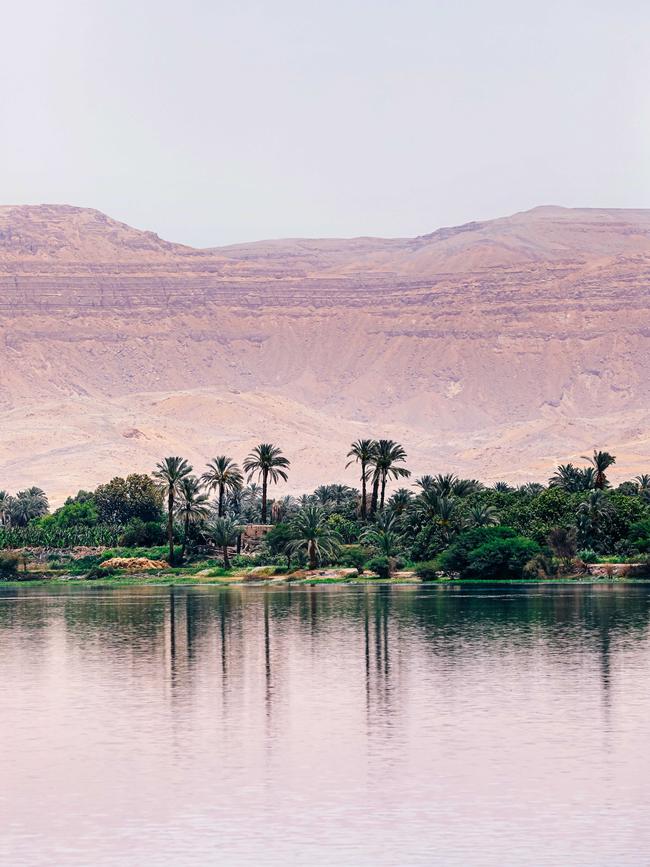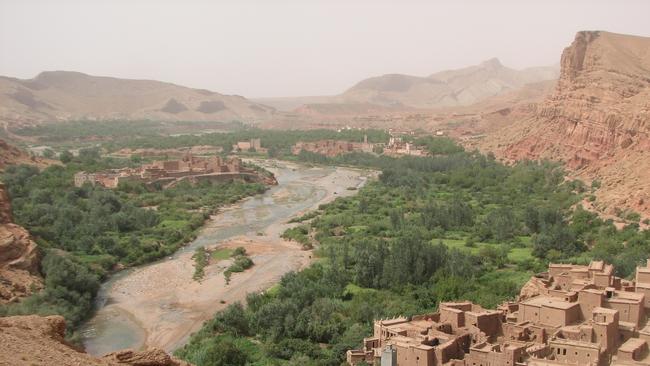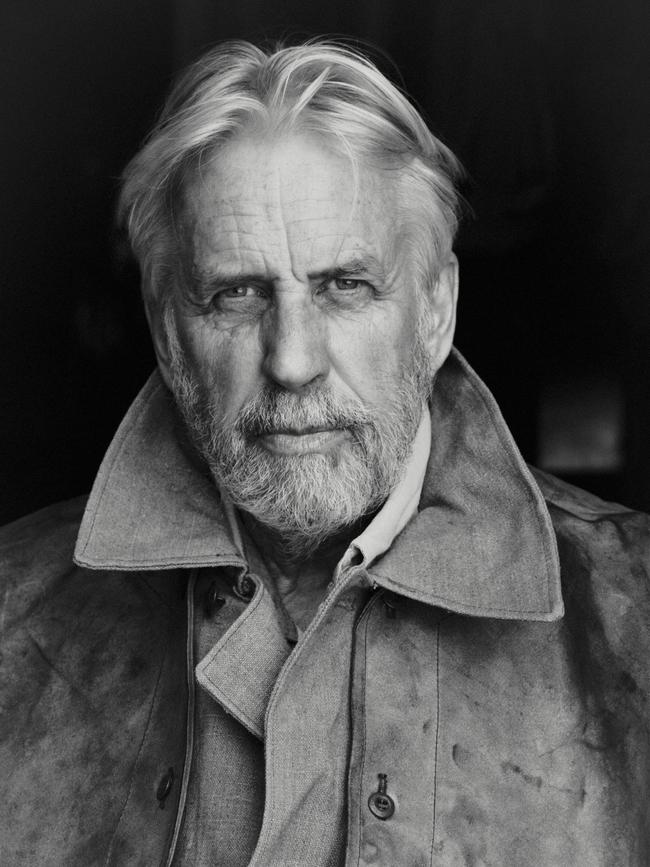The most powerful lesson travel can teach us
Venturing to the world’s most remote and extreme destinations can deliver a dose of humility if we are open to the signs.

In October of 1849, Gustave Flaubert set off for Egypt with his friend Maxime du Camp. Fame for the author of Madame Bovary, published in 1856, still lay some years in the future. When the two men arrived in Cairo, Flaubert was just another young bourgeois Frenchman, self-absorbed, spoiled, arrogant, living on a family inheritance and unnaturally tied to an overbearing mother. Egypt asks a lot of questions of the traveller. I have just returned from the Nile, travelling in Flaubert’s wake, aboard the SS Sudan, the last of the old Thomas Cook paddle-wheel steamers. The boat was an Edwardian delight, a well-ordered make-believe world of brass bedsteads, afternoon tea, and cocktails before dinner.
But mornings ashore were another matter – all those temples and tombs and gods, the obsession with death and the afterlife. In murals in the tombs of the Valley of the Kings, I gazed at souls being weighed against a feather and at pharaohs embarking on the journey to the underworld under the beady eye ofthe jackal-headed god, Anubis. In fairness, it wasn’t the mummies or the tombs that got to Flaubert. It was Kuchuk Hanem. These days we would call her a sex worker.
-
Discover epic adventures from Africa to the Arctic in issue 10 of Travel + Luxury magazine.
-
In that distant time, in Egypt, she was an ulmeh, a learned woman. Spending the night with her served to remind him of his own insignificance. For all the reverie he wove around her, he knew that he would soon vanish from her memory. “Travel makes one modest,” Flaubert wrote. “One sees what a tiny place one occupies in the world.”
A dose of humility is probably not on most people’s bucket-list when it comes to travel. But I reckon there is much to be said for it. At home, on our yoga mats, doing our cross-legged meditation, many of us hope to curtail our own egos. Without going full Buddhist monk, we recognise the benefits of escaping a little from ourselves, and from our own often petty concerns and anxieties. Travel can be that escape. The world’s remote and rare landscapes can offer a sense of liberation. It is rare to come home unchanged.

On the Nile I woke early each morning to watch the first rays of the sun striking through the palm groves to lay avenues of light across the river. In the dawn, files of women, washing pots on their heads, followed paths through gossamer mists to the banks. The voices of children drifted across the water, echoing, elongated, disembodied. Clouds mottled the surface of the river and white egrets flew upstream, like fleeing angels. Egypt has been Egypt for so long – these riverside scenes are replicated on the walls of tombs 5000 years old. I felt the immense depth of time here, marching through long centuries, and our own tiny allotment of several decades.
It was a reminder to live more intensely. But it is the empty landscapes, the sheer scale of them, their indifference to us, their Edenic state, that is most affecting. They can disengage us a little from our own lives, while they also connect us to something greater than ourselves. Call it humbling, or call it inspiring. It makes no difference.
Three thousand miles west of the Nile, on the far side of Africa, I once drove south from Marrakech over the Atlas Mountains to the Dades Valley that skirts the northern fringes of the Sahara. A wilderness of volcanic rock and limestone pinnacles where rivers come and go as unpredictably as afternoon showers in Connemara, the valley is host to a string of oases. The largest and most delightful is Skoura, full of birdsong and bubbling irrigation channels. Sailing like a galleon among the palm trees of Skoura is the great kasbah of Dar Ahlam where secret passages and hidden chambers reflect the complexities of harem life. Dar Ahlam has been reborn as one of Morocco’s most exclusive hotels. I pushed open the huge wooden entrance door, and stepped into an Arabian Nights world of fountained courtyards and cushioned alcoves. Terraces led outside to lush walled gardens. Steps climbed to roof terraces with panoramas over the tousled heads of the surrounding palm trees to the Atlas Mountains.
The world’s remote and rare landscapes can offer a sense of liberation. It is rare to come home unchanged.
Yet Dar Ahlam was only a stepping stone. I wasn’t here for the oases and the kasbahs. I was here for the desert. I set off the following morning with a driver in a 4x4, taking the road south over the Tizi n’ Bachkoum pass bounded by skeletal mountains. Eventually we emerged onto gravel plains that stretched away to unfathomable distances. We passed a small caravan of nomads resting beneath thorn trees while their hobbled camels grazed on scrub. Mirages began to appear – glistening lakes, floating trees – permanently out of reach. Such an emphatic geographical fact, the Sahara suddenly seemed strangely unreliable, not so much a physical entity as a trick of the light, some quirk of the imagination. Then suddenly we turned off the track into sand dunes, their backs as smooth as whales, and came to a halt. Porters materialised like desert djinns to unload my bags. A tent was prepared, nestled in the hollow of dunes that stretched away as far as I could see, golden in the late-afternoon sun. The size of a small chalet, my tent was Saharan chic – Berber rugs, wrought-iron lanterns, a double bed with piles of cushions, a palette of neutral colours. There was an attached bathroom with a clever water system to allow for desert showers, and a rather nifty chemical loo. In the world of Saharan travel, this was club class.

Night arrived with equatorial suddenness. A man appeared striding through the dark dunes with armfuls of light. He was carrying a dozen lanterns, laying them carefully across the sand slopes, marking out channels between my tent and the outposts of my evening. I followed them to dinner, reclining on bolsters by a candlelit table as waiters melted out of the darkness with a series of spectacular dishes – a spicy tomato-based soup known as harira, Berber tagine, and a heavenly concoction of orange, grapefruit and carrot – all served with a crisp Chablis.
None of which, I suppose, encourages much modesty. But later, lying on the dunes above my tent, I gazed up at stars clearer and closer than anywhere on Earth. I burrowed my bare feet into sand still warm from the day’s sun and looked at infinity. Here is the reason you should come to the Sahara. Its scale and its vast hostility is humbling. But even the Sahara is dwarfed by its own night skies, these endless constellations, thick as grapes, far too remote to understand. Gazing up into a dense universe, with no beginning and no end, I felt no greater than one of the grains of sand beneath my hands. But I also felt anchored. However tiny those deep star-spangled skies made me feel, I was connected to that immensity, some minute part of this turning infinity, so much greater than myself. Suddenly the universe, so spectacularly displayed here, seemed to lend my tiny life weight. The Sahara and those night skies are the ultimate cure for the unbearable lightness of being.

At the other end of the world, in the Sahara’s mirror opposite, I was in Antarctica earlier this year aboard the luxury vessel Le Commandant Charcot, which is pioneering sustainable travel to polar regions. The southern continent is a world of white abstractions, a place of superlatives, the world’s most extreme environment, alien, surreal, elemental, all spectacle and magnificence. On the shores of Devil Island in the Weddell Sea, I encountered my first penguin, waddling along the shore, a little hurriedly, as if he was late for a meeting. I stopped as he waddled towards me, not wanting to disturb him. He barely seemed to notice me, as if I didn’t really exist. A few feet from me, he paused, and made a minor detour in his progress so as not to walk straight into me. For a penguin, I was hardly of more note than a boulder.
The penguin could be a metaphor for this continent. This is the one place on Earth that makes absolutely no concession to human existence, offers no facilities, no toehold for human habitation. It seems entirely indifferent to us. But unfortunately it is not immune to us. Like the rest of the planet, Antarctica is at our mercy. Ironically the coldest place on Earth turns out to be ground zero for global warming. Temperatures are rising three times faster here than anywhere else. Any projection of these trends would prove catastrophic for ocean levels across the entire world. If we fail to control our emissions, our consumption, the melting of Antarctic ice by the end of the century will mean cities like Miami and Bangkok will not survive in their current form. I came home humbled by the grandeur and the beauty of Antarctica. And ashamed of the swaggering arrogance with which all of us are undermining it. My hope is that a dose of humility might soon lead to some change in our behaviour. We are running out of time to act more modestly.
